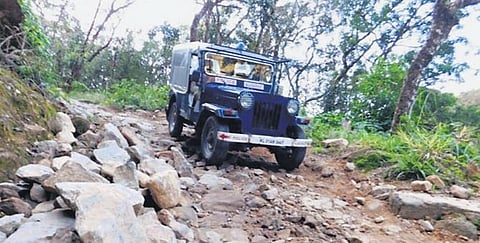

IDUKKI : It was at a time when outsiders were trying to infiltrate the highly vulnerable Muthuvan community of Edamalakkudy tribal settlement, by taking advantage of the inhospitable terrain and the illiterate people, to execute their hidden agendas that the state police deployed a special tribal intelligence team to flush out troublemakers from the settlement.
Set up in 2012, the six-strong team was reduced to four after two members backed out. Yet the group, comprising two lady officers, was determined to reach out to the tribal people to understand their needs and grievances. The result of their nearly two-year-long effort, which started in 2016, was the first official police report on the Edamalakkudy tribal settlement – the first tribal panchayat in the state. Their study is now used as a guide by the state government and other departments to execute welfare projects for tribal communities.
Pakurudeen A M, then sub inspector at Munnar police station, Madhu V K (ASI), Laijamol K M and Khadeeja Beevi, civil officers with Munnar station were selected taking into consideration their knowledge of the area, having worked as Janamaithri police in Munnar region.
“Although Edamalakkudy was familiar to all of us, the task of preparing an extensive first-hand report on the tribal panchayat turned out to be challenging due to the remoteness of the location, tucked away as it is deep inside the forest, nearly 36km from Munnar town, and the lack of transportation, network and communication facilities,” Pakurudeen, who has since superannuated, said.
A round trip from Munnar to the settlement used to take four to five days. This involved travelling through 28 kudis (hamlets) of Edamalakkudy panchayat, covering 20-30km a day. To connect with family members, they had to rely on network signals originating from Tamil Nadu, which could only be accessed at higher locations like hilltops, forest border points and even atop trees.
Most kudis were 8-10km apart and food and other items had to be carried as headload, Pakurudeen recounts. “Walkie-talkies were the only solace for those of us who got stranded in the forest or lost their way. Getting separated from the team was a regular occurrence, especially when members fled when wild animals were spotted en route,” he said.
Countering fake reports
In 2012, fake reports emerged on poverty deaths and killings in Edamalakkudy, which were part of a larger conspiracy by outside forces to get tribal people to rebel against the government, Pakurudeen said.
“The first step to countering such reports was to understand the population of the community. By visiting each tribal home and making enquiries about reports of people, including children, going missing, we took a count of the tribal people of the 24 kudis, of which four were uninhabited. We also lived among them and prepared a detailed report on their culture, beliefs and practices,” Pakurudeen said.
The report laid bare the key problem of low birth rates and infertility, as a result of the extensive use of Mala-D contraceptive pills, among women in the settlement. After it was published, there were efforts by police and the health department to stop supply of the pill to pharmacies in Valparai, Munnar and Marayur areas, from where the tribal people sourced it.
“Muthuvans are trustworthy people. Even while staying at the settlement, which lacks even basic facilities, we felt safe,” remembers Khadeeja. “Our suggestions in the report, which was submitted to the Idukki SP in 2018, included opening a police outpost and a panchayat office in the settlement. But these are yet to be implemented,” says Pakurudeen. “Some of the kudis now have 4G and power connectivity. But many other facilities remain a distant dream for residents,” he adds.
The state government honoured the team members in 2018. Madhu (sub inspector) and Laija (senior civil officer - pink patrol) continue to work at Munnar station, while Khadeeja has been deployed as assistant sub inspector at Vellathooval station in Idukki.